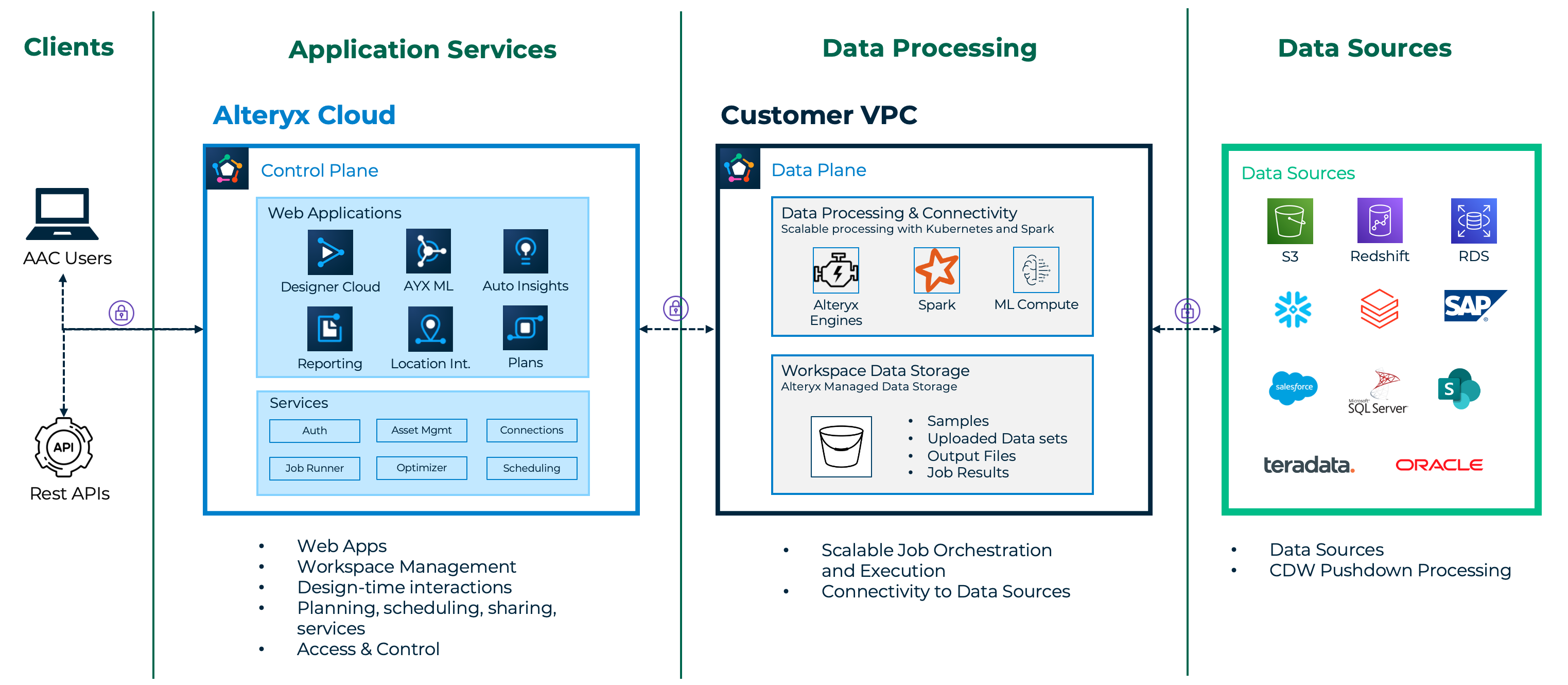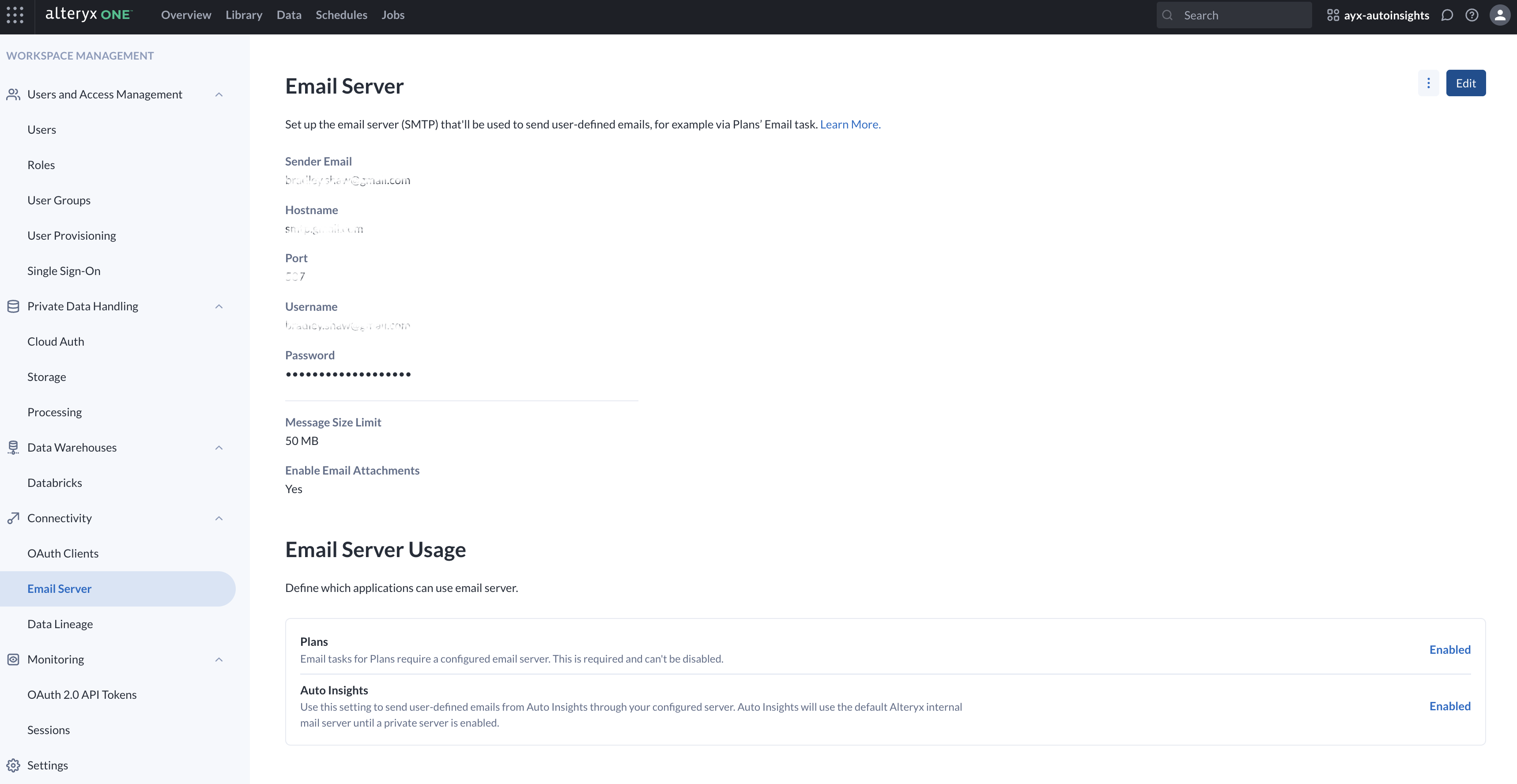Verarbeitung privater Daten
Die Handhabung privater Daten ist eine Funktion in Alteryx One Platform, die es Ihnen ermöglicht, Ihre Daten zu speichern und Datenverarbeitungsaufgaben in Ihrer eigenen Cloud-Infrastruktur auszuführen. Die Handhabung privater Daten bietet mehr Sicherheit und Kontrolle für diejenigen, die sensible Daten besitzen. Außerdem führt dies zu einer verbesserten Leistung und geringeren Kosten für ausgehenden Datenverkehr, da die Verarbeitung in Alteryx One in der Nähe Ihrer Daten erfolgt.
Warnung
Löschen Sie niemals Ressourcen, die für die private Datenverarbeitung bereitgestellt sind.
Überblick
Auf der höchsten Ebene unterscheidet Alteryx One zwischen Kundendaten und Anwendungsmetadaten.
Kundendaten gehören Ihnen. Es handelt sich dabei um alle Daten aus einer Ihrer Datenquellen sowie alle daraus abgeleiteten Daten. Dazu gehören Datensätze aus Ihren Datenbanken, Tabellenkalkulationen, freigegebenen Laufwerke und Data Warehouses, die Sie verbinden und zusammenführen, vorbereiten und kombinieren, analysieren und mit denen Sie Modelle trainieren möchten. Außerdem zählen dazu Ausgaben, Berichte und Datasets, die aus diesen Datensätzen erstellt wurden.
Anwendungsmetadaten sind alle anderen Daten. Dies sind die Daten, die Alteryx One für die Ausführung der von Ihnen gewünschten Aufträge benötigt. Dazu gehören Arbeitsbereichslayout und -konfiguration, Benutzeranmeldung, Rollen und Berechtigungen, freigegebene Assets, Workflow-Namen und Tool-Konfiguration. Einige konkrete Beispiele:
Designer Cloud-Tool-Konfigurationen und -Layouts
Auto Insights-Berichte zu Texteingaben und Analyseparametern (Filterwerte, Spaltennamen)
Inhalt des Dropdown-Felds „App Builder“.
Von Benutzer:innen generierte Inhalte, wie Kommentare zu Magic Reports.
Alteryx One verwendet eine Split-Plane-Architektur und hat die Verantwortung für diese zwei Arten von Daten in verschiedene Ebenen aufgeteilt, um den Kund:innen mehr Flexibilität zu bieten. Diese 2 Ebenen sind die Steuerungsebene und die Datenebene.
Ebene | Beschreibung |
|---|---|
Steuerungsebene | Die Steuerungsebene unterstützt die Entwicklungszeit-Erfahrung von Benutzer:innen, fungiert als Befehls- und Steuerungszentrum und speichert Anwendungsmetadaten. |
Datenebene | Die Datenebene ist für die dauerhafte Speicherung und Verarbeitung von Kundendaten verantwortlich. Persistenter Speicher Alteryx One Platform nutzt Datei- und relationale Datenspeicher für die langfristige Speicherung von Kundendaten. Dateispeicher wird verwendet für:
Relationaler Speicher
Verarbeitung Alteryx One Platform erledigt viele Aufgaben, die der Kategorie Verarbeitung zugeordnet werden, zum Beispiel:
|
Mit der Handhabung privater Daten können Sie die Datenebene ganz oder teilweise auf Ihrer eigenen Infrastruktur ausführen, sodass Sie Optionen für die Speicherung und Verarbeitung von Daten haben. Dies umfasst zwei Funktionen:
Privater Dateispeicher: Verwenden Sie Alteryx One, um den Alteryx-Dateispeicher durch Ihren eigenen Cloud-Speicher-Bucket zu ersetzen. Nach der Konfiguration erfolgt die persistente Dateispeicherung von Kundendaten auf Ihrer eigenen Festplatte. Privater Dateispeicher unterstützt AWS S3, Azure ADLS und Google Cloud Storage.
Private Datenverarbeitung: Diese Funktion ähnelt konzeptionell privaten Dateispeichern, gilt aber für die relationale Speicherung und Verarbeitung. Sie können zuerst Ihre VPC konfigurieren und dann Alteryx One Platform anweisen, dort eine vollständige Datenverarbeitungsumgebung bereitzustellen. Nach der Konfiguration werden alle anderen oben genannten Datenebenenaktivitäten in Ihrer VPC ausgeführt.
Verfügbare Funktionen:
Funktion | Verfügbarkeit |
|---|---|
Privater Datenspeicher |
|
Private Datenverarbeitung |
|
Architektur
Wenn Sie privaten Dateispeicher und die private Datenverarbeitung für Ihren Arbeitsbereich konfigurieren, werden Kundendaten (die Datensätze aus Ihren Datenquellen) nur in Ihrer Infrastruktur gespeichert. Das heißt, in Ihren Cloud-Speicher-Buckets und Datenquellen. Die Alteryx One-Steuerungsebene initiiert Interaktionen mit Ihrem privaten Datenspeicher und der Datenverarbeitungsumgebung in Ihrer VPC. Die Datenverarbeitungsumgebung stellt auch eine direkte Verbindung zu Ihren Datenquellen her, um Daten abzurufen und zu übertragen.

Wenn ein:e Benutzer:in über eine aktive Sitzung verfügt, werden die Kundendaten auf ihrem Pfad zum Browser die Steuerungsebene durchlaufen. Es gibt auch Datenströme, bei denen Kundendaten in der Steuerungsebene verarbeitet werden. Sie werden dort jedoch niemals über die Dauer einer Sitzung hinaus gespeichert oder zwischengespeichert, mit einer maximalen Speicherdauer von einer Stunde. Beispiele:
Zur Designer Cloud-Entwicklungszeit werden Stichprobendaten in der Steuerungsebene überprüft und formatiert (für die Erkennung von Trennzeichen und Kopfzeile, Spaltenname und Typ-Inferenz und die Funktion für das Umwandeln nach Beispiel).
Bei der Auto Insights-Datasetaufnahme finden Dateninferenz und Metadatenextraktion auf der Steuerungsebene statt.
Auto Insights führt die Nachverarbeitung von Abfrageergebnissen durch, um Daten zu klassifizieren, umzuwandeln, anzuzeigen und darzustellen.
E-Mails und PDF-Berichte werden auf der Steuerungsebene generiert, und wenn ein E-Mail-Server konfiguriert ist, werden Missionszusammenfassungen und Bericht-PDFs über den konfigurierten Server gesendet.
GenAI-Prompts können Kundendaten enthalten und werden auf der Steuerungsebene generiert.
GenAI-Antworten können Kundendaten enthalten und werden auf der Steuerungsebene geparst und umgewandelt.
Hinweis
Haftungsausschluss in Bezug auf LLMs
Daten, die an ein LLM gesendet werden, fallen nicht in den Geltungsbereich dieses Dokuments. Alteryx kann nicht kontrollieren, wie Daten gespeichert oder verarbeitet werden, nachdem sie an ein LLM gesendet wurden. Einzelheiten zum Umgang mit Prompt-Daten finden Sie in der Dokumentation des Anbieters. Alteryx nutzt sowohl Azure OpenAI als auch Google Gemini für KI-basierte Funktionen wie Alteryx CoPilot und Auto Insights-Playbooks.
Anmerkung
Eine Anmerkung zur Texteingabe
Verwenden Sie immer von Alteryx bereitgestellte Konnektoren, um sensible Daten zu verbinden. Integrieren Sie sensible Daten nicht direkt in Ihre Workflows. Kopieren Sie beispielsweise keine Datensätze von Kundendaten und fügen Sie sie nicht in das Texteingabe-Tool in Designer Cloud ein. Die Tool-Konfiguration, einschließlich des Inhalts des Texteingabe-Tools, wird als Metadaten behandelt und unterliegt nicht den oben genannten Kontrollen.
Datensicherheit
Alteryx bietet ein Whitepaper zum Download an, das sich eingehend mit der Handhabung privater Daten, dem Datenschutz und der Sicherheit befasst. Einen Link zu diesem Dokument finden Sie unter alteryx.com/trust im Abschnitt „Handhabung privater Daten“.
Der Einfachheit halber hier einige wichtige Punkte für die Verschlüsselung von Daten während der Übertragung und im Ruhezustand:
Daten, die zwischen Browser <=> Steuerungsebene und Steuerungsebene <=> Datenebene übertragen werden, werden mit TLS 1.3-Verschlüsselung verschlüsselt.
Alteryx verwendet die mTLS-Verschlüsselung für die Kommunikation innerhalb des Clusters.
Dateispeicher und Datenbank-Anmeldedaten werden in einer Datenbank in der Steuerungsebene gespeichert, die mit 256-Bit-AES-Blockchiffren verschlüsselt ist.
Die Umschlagverschlüsselung wird auf diese Anmeldedaten angewendet, bevor sie von der Steuerungsebene an die Datenebene übergeben werden und den Auftrags-Pods als Kubernetes-Geheimnisse zur Verfügung gestellt werden.
Der private Schlüssel, der zur Entschlüsselung der verschlüsselten Anmeldedaten verwendet wird, wird im Geheimnismanager des Cloud-Anbieters in der Datenebene gespeichert und mit dem Operator für externe Geheimnisse in den AYX-Cluster eingebunden.
Workloads greifen über ein Kubernetes-Dienstkonto auf Geheimnisse im Geheimnismanager zu.
E-Mail-Sicherheit
Standardmäßig werden E-Mails wie Missionszusammenfassungen und Bericht-PDFs von no-reply@mail.alteryxcloud.com gesendet.
Arbeitsbereich-Administrator:innen können einen benutzerdefinierten SMTP-E-Mail-Server konfigurieren. Bei entsprechender Konfiguration werden Missions-Zusammenfassungen und Bericht-PDFs über diesen Server gesendet.
Aus Sicherheitsgründen werden Anhänge in Alteryx One-Apps im Allgemeinen nicht unterstützt. Auto Insights ist jedoch eine Ausnahme. Auto Insights-Bericht-PDFs können Anhänge enthalten, sofern sie die unterstützten Größenbeschränkungen erfüllen.

Upgrades
Ein Vorteil von Software-as-a-Service besteht darin, dass Sie sich keine Gedanken über Upgrades machen müssen. Alteryx One verwaltet Upgrades für Sie.
Software-Upgrades für Dienste mit langer Ausführungszeit und kurz andauernde Aufträge werden für Sie verwaltet. Wenn neue Versionen der Software verfügbar sind, werden neue Container-Images an unsere Image-Repositorys gesendet. Alteryx One Platform ruft diese neuen Image-Versionen ab und beginnt nahtlos mit der Verwendung innerhalb des Clusters, ohne dass laufende Aufträge unterbrochen werden.
Alteryx verwaltet auch Infrastruktur-Upgrades in Ihrem Namen.
Metrikerfassung
Alteryx One verwendet Datadog zur Erfassung von Nutzungsdaten zur Anwendungsüberwachung, um die Betriebsstabilität zu überwachen und aufrechtzuerhalten. Der Datadog-Agent erfasst die folgenden Metriken:
Telemetriemetriken vom Kubernetes-Cluster, Speicher-Bucket, Spark-Prozessor (wenn aktiviert) und von Rechenknoten.
Benutzerdefinierte Protokolle der Dienste im Verarbeitungscluster.
Protokolle des Cloud-Anbieters (z. B. AWS CloudWatch und Azure Monitor) für die verwendeten öffentlichen in der Cloud verwalteten Dienste.
Handhabung privater Daten konfigurieren
Die Konfiguration der Handhabung privater Daten umfasst drei Schritte: Konfigurieren des privaten Dateispeichers, Konfigurieren der privaten Verarbeitung privater Daten und Konfigurieren eines privaten E-Mail-Servers.
Privater Dateispeicher
Alteryx Data Store (ADS) ist der Alteryx-Dateispeicher. Dies ist der Standardspeicherort für alle neu erstellten Arbeitsbereiche.
Der private Dateispeicher ermöglicht es Ihnen, ADS durch Ihren eigenen Dateispeicher zu ersetzen. Danach sind ist der Zugriff auf alle Daten, die in ADS gespeichert sind, nicht mehr möglich. Endbenutzer:innen erhalten die beste Benutzererfahrung, wenn Sie diese Konfiguration durchführen, bevor sie den Arbeitsbereich verwenden.
Der private Dateispeicher unterstützt AWS S3, Azure ADLS und Google Cloud Storage (GCS) als Speicheranbieter.
Nachdem Sie den privaten Dateispeicher im Cloud-Anbieter Ihrer Wahl konfiguriert haben, können Sie mit der Verarbeitung privater Dateien in demselben Cloud-Anbieter fortfahren.
Anweisungen zur Einrichtung finden Sie in einem der folgenden Artikel:
Private Datenverarbeitung
Die private Datenverarbeitung ermöglicht Ihnen die Verarbeitung von Alteryx-Daten in Ihrer eigenen VPC. Um diese Funktion zu konfigurieren, müssen Sie die Einrichtungsschritte zur Vorbereitung der VPC auf die Ausführung der Verarbeitung der Alteryx-Daten abschließen. Für jedes Alteryx One Platform-Produkt gibt es separate Einrichtungsanweisungen. Sie können mehrere Produkte auf derselben Datenebene ausführen, nachdem Sie die Einrichtung für jedes Produkt abgeschlossen haben.
Nach Abschluss der VPC-Einrichtung melden Sie sich bei Alteryx One Platform an und aktivieren die private Datenverarbeitung für alle Lösungen, die Sie in Ihrem Arbeitsbereich verwenden möchten.
Alteryx empfiehlt die Verwendung eines dedizierten Kontos und einer dedizierten VPC, um optimale Sicherheit und Stabilität zu gewährleisten. Andere Konfigurationen sind jedoch auch möglich.
Weitere Informationen zur privaten Datenverarbeitung, einschließlich des Modells der gemeinsamen Verantwortung, den erforderlichen Cloud-Ressourcen für verschiedene Anwendungen, der regionalen Verfügbarkeit und weiteren Aspekten finden Sie unter Private Data Processing.
Nachdem Sie die private Datenverarbeitung aktiviert haben, sind je nach Ihrer Lösung möglicherweise zusätzliche Einrichtungsschritte erforderlich. Nachdem Sie beispielsweise die private Datenverarbeitung für Designer Cloud aktiviert haben, müssen Sie Ihre Berechtigungen für den privaten Datenspeicher aktualisieren, damit der Datenverarbeitungscluster auf Ihren Datenspeicher zugreifen kann.
Alteryx empfiehlt die Verwendung eines dedizierten Kontos und einer dedizierten VPC, um optimale Sicherheit und Stabilität zu gewährleisten. Andere Konfigurationen sind jedoch auch möglich.
Folgen Sie diesen Anleitungen, um eine private Datenverarbeitung basierend auf Ihrem Cloud-Anbieter einzurichten:
Privater E-Mail-Server
Mit der Funktion „Privater E-Mail-Server“ können Arbeitsbereich-Administratoren einen benutzerdefinierten SMTP-Server verwenden. Ist die Konfiguration erfolgt, werden Missionszusammenfassungen und Bericht-PDFs von der Infrastruktur der Organisation anstelle des Standard-Alteryx-Servers gesendet. Konfigurationsanweisungen finden Sie unter Einrichtung des E-Mail-Servers.
Bekannte Einschränkungen
Dies sind einige bekannte Einschränkungen für die private Datenverarbeitung:
Jeder Arbeitsbereich kann nur einer Datenebene zugeordnet werden.
Einige Alteryx One Platform-Apps sind noch nicht mit der privaten Datenverarbeitung kompatibel und werden in einem Arbeitsbereich deaktiviert, in dem die private Datenverarbeitung aktiviert ist.
Die Verwendung von SSH-Tunneln mit Konnektoren wird in einem Arbeitsbereich mit privater Datenverarbeitung noch nicht unterstützt.
Aus Sicherheitsgründen werden Anhänge in Alteryx One-Apps im Allgemeinen nicht unterstützt. Auto Insights ist jedoch eine Ausnahme. Auto Insights-Bericht-PDFs können Anhänge enthalten, sofern sie die unterstützten Größenbeschränkungen erfüllen.
Der E-Mail-Support ist derzeit nur für Pläne verfügbar. Wenn diese Funktion aktiviert ist, werden Missionszusammenfassungen und Bericht-PDfs über den konfigurierten E-Mail-Server versendet. Die Unterstützung für weitere Apps wird in Kürze verfügbar sein.